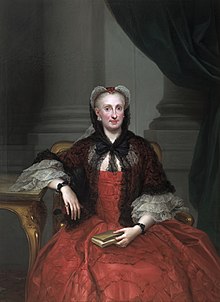Maria Amalia of Saxony
A popular consort, Maria Amalia oversaw the construction of the Caserta Palace outside Naples as well as various other projects, and she is known for her influence upon the affairs of state.
On 8 May 1738, Maria Amalia had a proxy ceremony at Dresden with her brother, Frederick Christian of Saxony, representing Charles.
Despite being an arranged marriage, the couple became very close: it was noted and reported to her mother-in-law in Spain, that Charles seemed happy and pleased when he first met her.
As Queen, she exerted great influence upon politics despite her frequent illnesses, and she actively participated in state affairs.
[5] Maria Amalia was talked about because of her favorites, which were to have influence over her policy when she was very ill, such as princess Anna Francesca Pinelli and duchess Zenobia Revertera.
[6] Maria Amalia was very cultivated and played an important role in the construction of Caserta Palace,[citation needed] for which she saw her husband lay the foundation stone for on his 36th birthday, on 20 January 1752 amid much festivity.
Ferdinand lost his devoted wife, Infanta Barbara of Portugal in August 1758 and would fall into deep mourning for her.
He named Charles his heir on 10 December 1758 before leaving Madrid to stay at Villaviciosa de Odón where he died on 10 August 1759.
Her third-surviving son became Ferdinand I of the Two Sicilies, while his elder brother Charles was groomed in Spain to inherit the Spanish crown; their oldest brother, Infante Felipe, Duke of Calabria was mentally disabled and was thus taken out of the line of succession to any throne; he died quietly and forgotten in Portici where he had been born in 1747.
She, along with her husband, helped with the founding of the luxury porcelain factory under the name Real Fábrica del Buen Retiro.
[citation needed] Maria Amalia deemed Spain to be ill managed and undeveloped, and she partially blamed her mother-in-law, Queen Dowager Elizabeth Farnese, who was thereby obliged to leave the Spanish court.
[citation needed] She did not like it in Spain, and complained about the food, the language, which she refused to learn; the climate, the Spaniards, whom she thought to be passive and the Spanish courtiers, whom she regarded as ignorant and uneducated.
[9] In September 1760, a year after arriving in Madrid, Maria Amalia suddenly died at the Buen Retiro Palace outside the capital.



